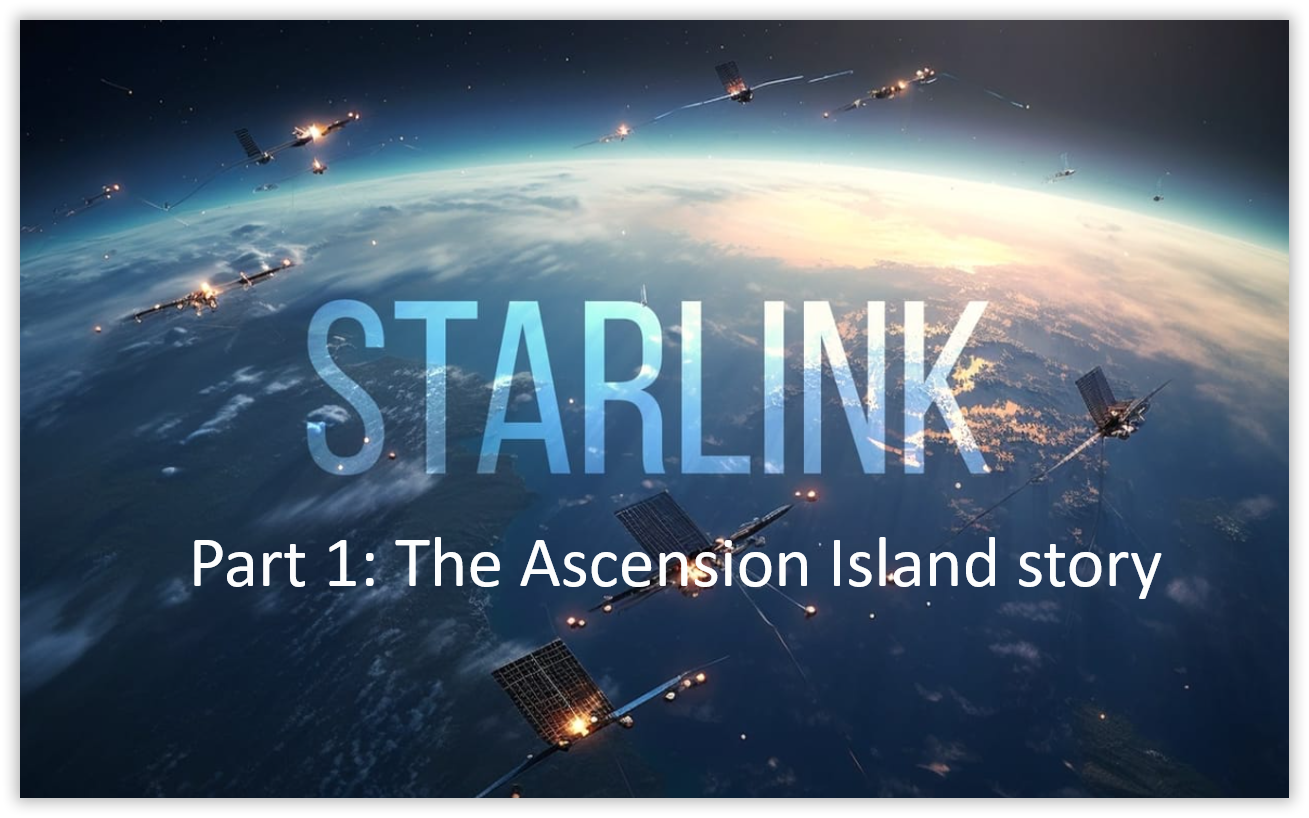
21st June 2024 update:
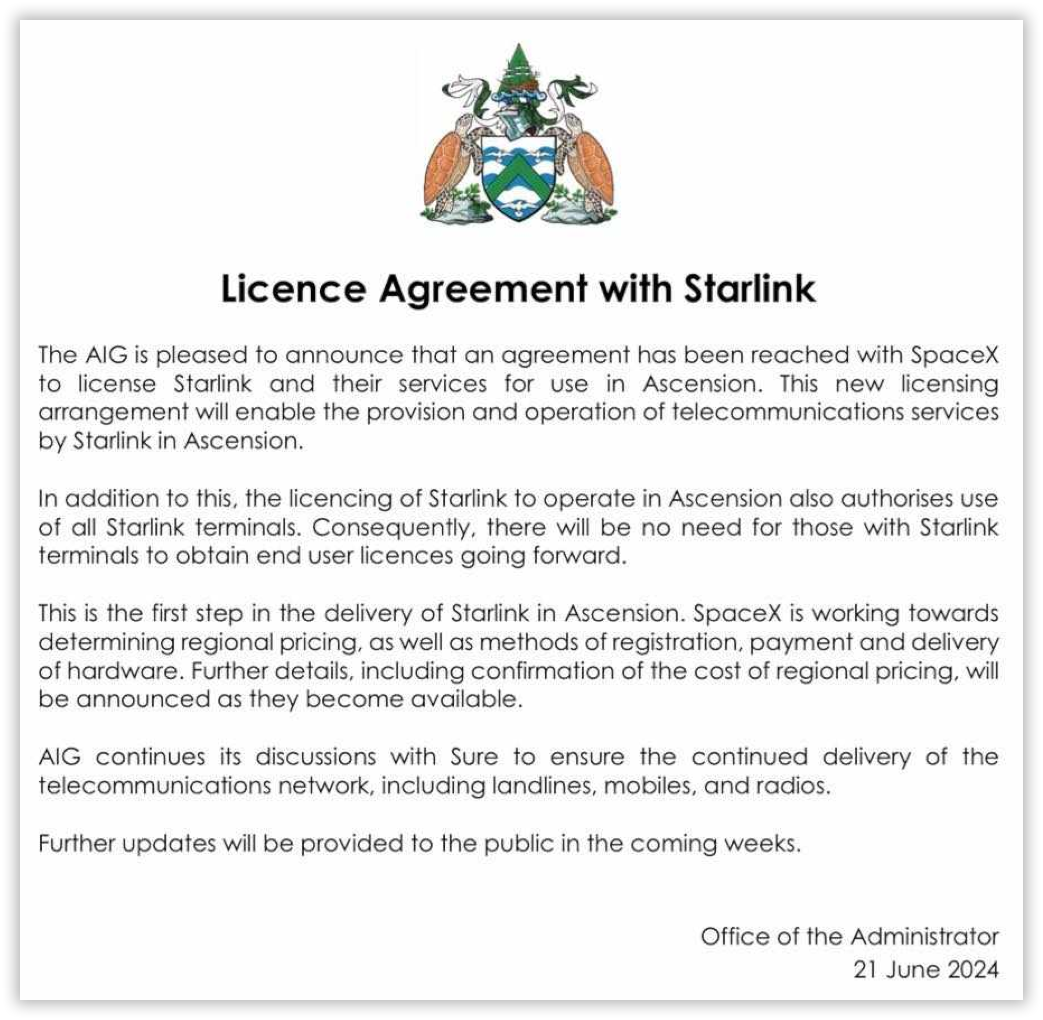
It’s been a while since I published the history of VSAT legislation in the Falkland Islands in September 2022, which describes what led to sky-high VSAT licence fees of £5,300 to deter applicants. However, much recent activity has about Starlink in the islands where Sure Falkland Islands has a communications monopoly until 31st December 2027. Through these two posts, I want to bring these recent activities to the attention of a much wider audience.
But before we do this, I think it is worthwhile looking in Part 1 at what has happened regarding the use of Starlink on the South Atlantic island of Ascension, which also has a communications monopoly provided by Sure Ascension Island. The reason for doing this is that they have followed an interesting path that led to the legalisation of Starlink terminals despite the monopoly. Could this be what will happen in the Falkland Islands?
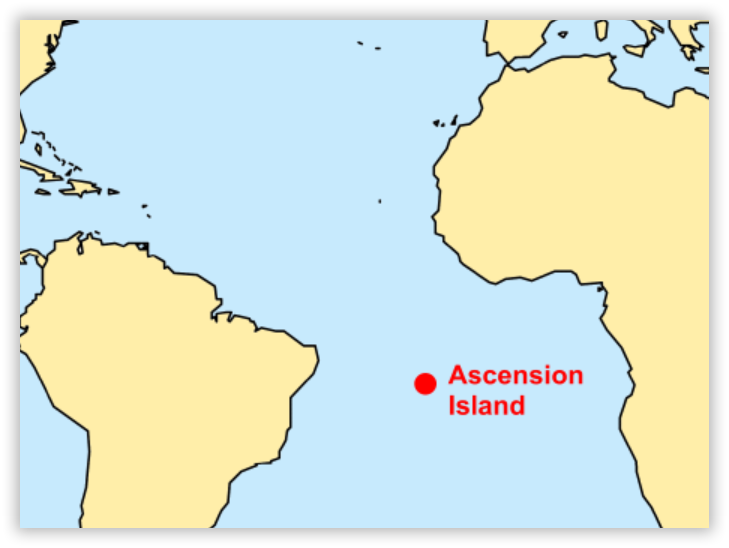
Ascension is not part of the United Kingdom, like other Overseas Territories. It has its own constitution (shared with St Helena and Tristan da Cunha), is internally self-governing, and makes its own laws. Take a look at Ascension: The island where nothing makes sense for an overview of the island. It’s a wonderful place, having last visited in 2000.
Like many other islands around the world that do not have the benefit of being digitally connected to the world through the provision of an undersea fibreoptic cable, Ascension islanders have to rely on the use of geostationary Intelsat satellite for their connection to the outside world. This is very expensive and slow, making using the Internet on the island a painful process for consumers. (St Helena now has an undersea cable, radically transforming their communications environment).
A group of the island’s consumers believed that the advent of the Starlink Low Earth Orbit (LEO) constellation could significantly change poor Internet performance by providing Internet access at rates of 100s of Mbit/sec. However, its adoption was hindered by the monopoly, as the Ascension Islands Government (AIG) needed to support that monopoly for legal reasons.
It all started with a well-organised Internet users’ pressure group, who, assumedly, were so fed up with the slow Internet service on the island that they pushed for Starlink to be made available. The initial view of AIG was that this could not be supported as it would break the Internet service provider’s monopoly. Of course, the provider would vehemently object to that happening as well.

Following this statement by AIG, the following was found on X (formally Twitter):
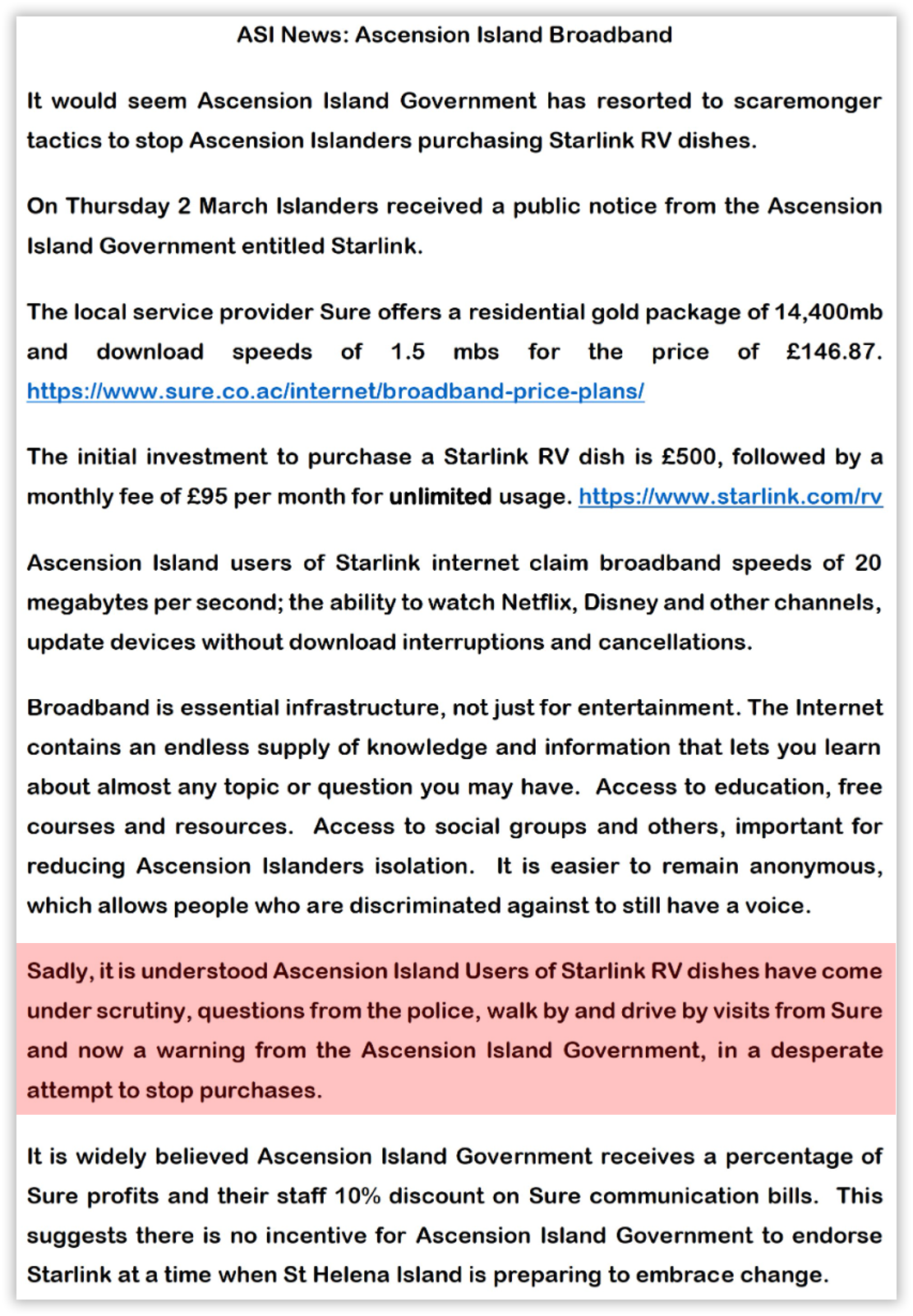
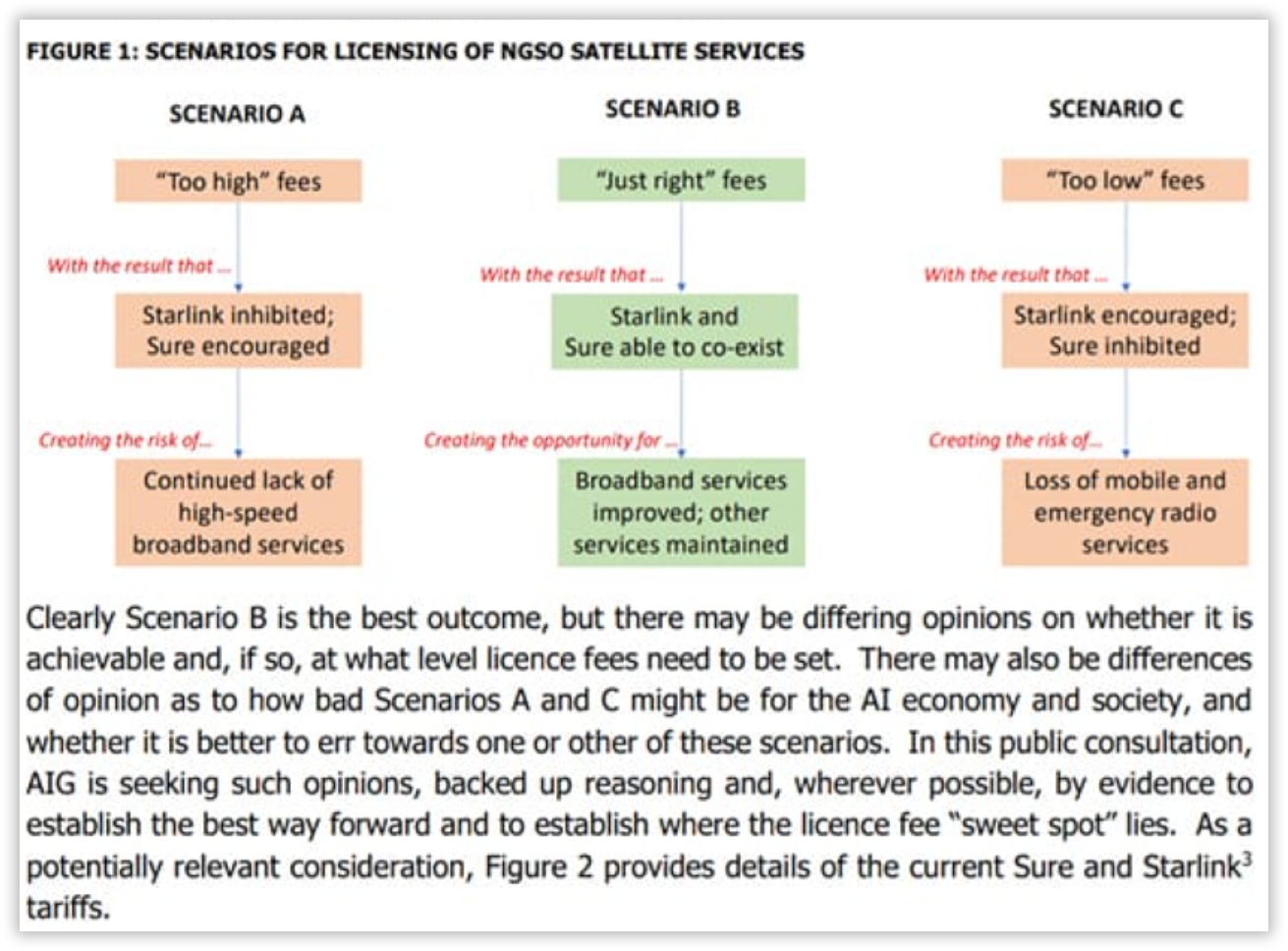
AIG is in the middle of a consultation and technical review of on island capabilities, with the goal of updating the surrounding policy and implementing new legislation to replace the outdated Telecommunications Ordinance 1997. During the process of the consultation, an urgent issue has arisen regarding NGSO licensing, due to the arrival of Starlink terminals on island. A consultation was launched to deal with this immediate issue, while work on the new policy framework continues.
The following course of action will take place, until the conclusion of the full telecommunications consultation and implementation of a new Communications Ordinance (Ed: See original for the complete text):
♦ A class licence will be issued for the installation and use of NGSO end user terminals in Ascension (Ed: like an amateur radio licence).
♦ Registration will cost £10 and will last 12 months.
♦ Registration will be per terminal and will be registered to the primary property where the end-user terminal is located;
♦ The registration will have no limit on the number of users per terminal;
♦ The Ascension Island Government’s (AIG) consultation on Telecommunications remains ongoing.
♦ The AIG is negotiating with Sure in an effort to ensure continuity of essential services, this extends beyond broadband. The time horizon being considered is currently two years. If successful, it will result in the need for compromise by all parties. How AIG will proceed if compromise cannot be secured is presently uncertain. Councillors and the community will be consulted when/if we have an outline agreement with Sure. AIG is committed to providing clarity as soon as possible.
♦ No operating licence for Ascension has been applied for by SpaceX for the provision of Starlink under the Telecommunications Ordinance, 1997. SpaceX have indicated to the AIG that a new Ordinance and regulatory regime will need to be in place before the company decides whether to seek a licence to operate in Ascension. As set out by the AIG in last year’s public consultation, the cost of a Starlink residential package in one territory does not guarantee the cost in another.
♦ Completion of the new regulatory regime for telecommunications remains a priority for the AIG, as does ensuring the continuity of essential services which include land-line telephone and broadband services, radio communications, the “999” service, and the mobile telephone network.
♦ The Administrator explained that after months of negotiations with Sure, an agreement is expected to be reached within the month of February 2024, which will then be shared with Formal Ascension Island Council meeting – 01 February 2024.
♦ The Governor explained that one of the challenges faced following the arrival of Starlink is the subsequent challenge that it has presented to the Sure business model. HE the Governor highlighted the need to ensure the continuity of essential services such as land-line telephone and broadband services, radio communications, the “999” service, and the mobile telephone network.
♦ It was noted that a switch to an entirely Starlink operating model would not be able to provide the necessary capabilities to deliver the aforementioned essential services. AIG continue to negotiate with Sure to find a solution that would be sustainable to allow for the option of a transitional period at a future date, whilst doing so in a managed way to ensure these essential services remain available to the community of Ascension.
♦ The Governor explained that the AIG are continuing to seek expert advice on how best to move forward with Sure and have been doing so in an expeditious manner, with discussions ongoing over financial figures.
♦ The manifestation of Ascension’s current telecommunication climate is that Sure are now actively considering redundancies; given that their cost model is increasing, whilst their customer base has significantly reduced following the introduction of Starlink terminals.
♦ The Attorney General provided an overview of the challenges faced, noting that the expert consultants have been incredibly helpful in identifying potential operating models that will preserve essential services in Ascension and ensure continuity in the interim, with the long-term outcome still under consideration.
♦ The Attorney General thanked Councillors for providing community feedback, and emphasised that any interim or long-term arrangements that are put in place are not guaranteed to stand the test of time. Discussion was had regarding mutual dependencies and the need for essential service to be maintained.
“[T]heir revenue was principally made from international phone calls.”
Historically this would have been the case, back in the days when these could be used to cross-subsidise local calls, but no longer. Sure’s main source of revenue in Ascension is, or would have been, internet access, £1520 a month for a 1MBps connection with 6GB of data included.
By the way, in a classic case of ‘You couldn’t make this up’, Sky Mobile not only offers free roaming in Jersey, Guernsey and the Isle of Man, but also offers this in Ascension – https://www.sky.com/help/articles/sky-mobile-roaming-domestic
Yes, that Ascension!
Other small island territories like Niue in the Pacific leased out their phone lines to international premium rate service providers, but that source of revenue has dried up, and now Ascension’s (and St Helena’s) numbering has been hijacked by companies engaging in international revenue sharing fraud. I presented Sure in St Helena with evidence before my visit last year, only to be stonewalled.
When a friend of mine in the US was struggling to get through to her elderly, frail and terminally ill mother in St Helena, Sure told her to tell T-Mobile to reroute its calls, but why should that have been her job?
In a discussion in the Falklands last year, MLA John Birmingham expressed concerns that older people who only needed a standard telephone line would be disadvantaged were Starlink to be made freely available, but the reality is that fixed line telephony is moving towards VoIP, though Jersey’s experience has been mixed, with power outages.
However, it should not be hard to integrate local phone calls, including 999 access, into a VoIP service, though this would mean Sure having to charge a VoIP provider, Starlink or other, local rates, rather than the astronomical international ones it does at present – £1.71 a minute with Skype.
The German VoIP provider Sipgate offers UK customers free geographical numbers, but insists that they live in the relevant geographic area so that 999 calls go to the right place, even going as far as to send a special code to them in the post. (It does this in Germany too!)
As it happens, not only are telecom operators in Argentina required, following a court ruling, to charge no more for a call to the Falklands than for one within Argentina, but Movistar now charges half as much, even though the international prefix 00500 is used – https://ayuda.movistar.com.ar/pagos-y-facturacion/tarifas/tarifario/
4.014 pesos a minute works out as 0.36 pence a minute, and I doubt seriously Sure is charging Movistar that little – local calls within the Islands are 6 pence a minute for landlines and 10 pence a minute for mobiles.
Amusingly, Sure still offer Talk Away, which ‘gives you a 10% discount on up to three international telephone numbers from your fixed line’, to which it might add, passive aggressively: ‘Don’t all jump up at once!’
Courageous and prgmatic as you say – and an example for others. Now one interesting aside to shall-we-say conventional technology is when things go wrong, such as a major failure or disaster, there is only one alternative and quick-fix – but monopolistic providers care only about profit, not contingency nor indeed of providing the best service. (And regulators even if they exist in small territories aren’t effective.) https://www.reddit.com/r/Starlink/comments/1ah62iq/starlink_is_natural_disaster_scenario/